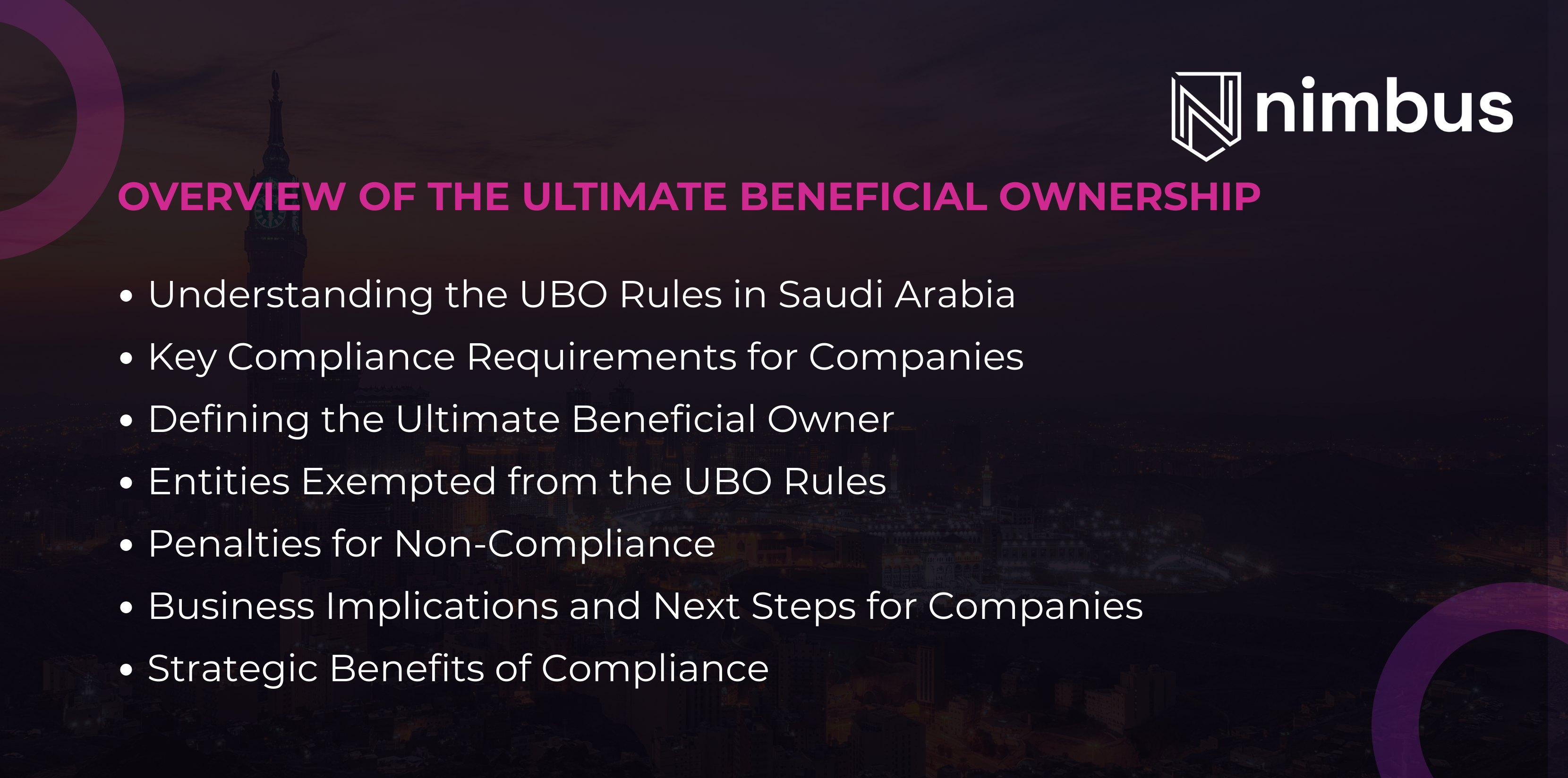Saudi Arabia has taken a significant step toward strengthening corporate transparency by introducing the new Ultimate Beneficial Ownership (UBO) Rules.
Issued by the Ministry of Commerce on 21 February 2025, the regulations aim to bring Saudi Arabia in line with international financial transparency standards and combat financial crimes like money laundering and tax evasion.
Effective 3rd April 2025, the new UBO Rules impose new compliance requirements on businesses operating in the Kingdom. Companies must disclose their UBOs, maintain accurate records, and report changes promptly, with substantial penalties in place for non-compliance.
This post offers a detailed breakdown of the UBO Rules, key compliance requirements, exemptions, and the practical implications for businesses in Saudi Arabia.
OVERVIEW OF THE ULTIMATE BENEFICIAL OWNERSHIP

– Understanding the UBO Rules in Saudi Arabia
The UBO Rules apply to most companies operating in Saudi Arabia, with a few notable exceptions. Publicly listed entities, state-owned enterprises, and companies undergoing liquidation under the Bankruptcy Law are exempt from these requirements.
The Ministry of Commerce retains the authority to grant exemptions on a case-by-case basis. The main objective behind the UBO Rules is to create a centralized and reliable register of ultimate beneficial owners across all businesses in the Kingdom.
By doing so, Saudi Arabia aims to promote greater transparency, strengthen its regulatory framework, and bolster its position as a leading investment hub aligned with global financial standards, including the guidelines set by the Financial Action Task Force (FATF).
– Key Compliance Requirements for Companies
Businesses operating in Saudi Arabia must adhere to several new obligations under the UBO Rules. These requirements are designed to ensure that ownership structures are clear and traceable.
Disclosure at Incorporation: All newly formed companies must disclose detailed information about their UBOs at the time of incorporation. This includes identifying individuals who meet the UBO criteria and providing supporting documentation.
Annual Filings: Companies must submit an annual update of their UBO information to the Ministry of Commerce on the anniversary of their commercial registration date. This ensures that the government maintains an up-to-date record of company ownership structures.
Maintaining a UBO Register: Each company is required to maintain a dedicated UBO register within Saudi Arabia. This register must contain accurate and detailed information about the UBOs, such as their full names, ownership percentages, national IDs or passport numbers, and any changes in their ownership status.
Timely Reporting of Changes: If there is a change in UBO information, companies must report it to the Ministry of Commerce within 15 days of the change. Prompt reporting is critical to maintaining compliance and avoiding penalties.
Annual Confirmation: Companies must annually confirm that their UBO records are accurate and up-to-date. This confirmation must be filed before the company’s registration anniversary each year.
– Defining the Ultimate Beneficial Owner
An ultimate beneficial owner, under the new Saudi regulations, is defined as any natural person who meets one or more of the following conditions.
- Owns at least 25 percent of the company’s share capital directly or indirectly.
- Controls at least 25 percent of the company’s voting rights.
- Has the authority to appoint or remove the majority of the company’s board of directors, manager, or chairman.
- Exercises significant influence over the company’s operations or decision-making processes.
In cases where no individual satisfies these criteria, senior executives such as managers, directors, or chairpersons will be considered the UBOs for compliance purposes.
– Entities Exempted from the UBO Rules
While the UBO disclosure requirements are broad, certain companies are exempt, including:
- Publicly listed companies on the Saudi stock exchange.
- State-owned companies, either fully or partially owned by the government.
- Companies undergoing liquidation procedures in line with the Bankruptcy Law.
- Any company specifically exempted by the Ministry of Commerce.
Exempt entities must still provide documentation to demonstrate their exempt status if requested by the Ministry.
– Penalties for Non-Compliance
Failure to comply with the UBO Rules can lead to severe consequences. Companies that do not disclose, update, or maintain accurate UBO records can face fines of up to SAR 500,000, which is approximately USD 133,000.
Beyond financial penalties, non-compliant businesses may be subjected to increased regulatory scrutiny, reputational damage, and potential barriers to operating in Saudi Arabia’s expanding economy.
Business Implications and Next Steps for Companies
The introduction of the UBO Rules requires businesses to take proactive steps to ensure compliance, especially for ones looking for business incorporation in Saudi Arabia.
Companies must establish internal processes for collecting and maintaining accurate UBO data and ensure that changes are tracked and reported promptly.
For companies with complex corporate structures, including those involving offshore entities, it is essential to conduct thorough internal audits to accurately identify and document UBOs.
Legal teams, compliance officers, and senior management must work together to assess existing ownership structures and address any gaps before the 3 April 2025 deadline.
Practical steps companies should take include:
- Reviewing ownership structures to identify ultimate beneficial owners.
- Establishing internal systems to track changes and maintain UBO registers.
- Assigning compliance officers or teams to manage ongoing UBO reporting obligations.
- Training relevant staff members on the new regulatory requirements.
- Seeking legal advice to ensure full alignment with the Ministry of Commerce’s expectations.
– Strategic Benefits of Compliance
While the new UBO Rules introduce additional compliance obligations, they also offer strategic benefits. Greater transparency enhances a company’s credibility with investors, partners, and regulators.
It reduces the risk of association with illicit activities and positions companies as trustworthy and responsible actors in the Saudi economy. For foreign investors, demonstrating compliance with UBO disclosure requirements can enhance access to government contracts, financial services, and other business opportunities.
Companies that proactively adapt to the new regulations will be better positioned to thrive in Saudi Arabia’s rapidly evolving business landscape.
Implementing UBO Rules in Saudi Companies
Saudi Arabia’s move to implement UBO Rules signals a continued commitment to international best practices in financial regulation and corporate governance.
For companies looking for a seamless business setup in the KSA, this means that compliance is no longer optional but an integral part of operating successfully in the Kingdom. With penalties for non-compliance set high and regulatory expectations increasing, businesses must act now to prepare for the changes.
By establishing robust internal processes and maintaining accurate UBO records, companies can navigate the new requirements with confidence and ensure their continued success in Saudi Arabia’s growing and dynamic economy.



